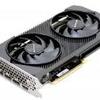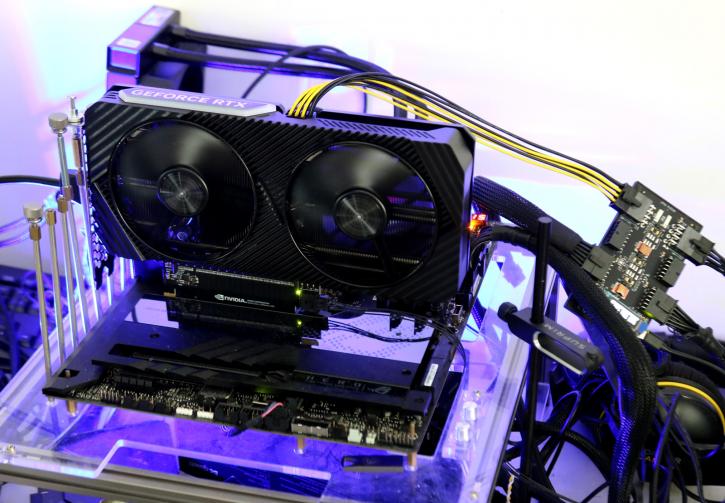Final words and conclusion
Final words
The Gainward GHOST OC edition features a minor modification to the GPU clock frequency, with a slight increase in the TGP allowance. This adjustment, however, results in whopping 1% increase in performance, lower than initially anticipated. Consequently, this product's performance is comparable to the founders edition. That founders edition competes vigorously with AIB cards, given its well-constructed product series. The Gainward GHOST, despite its high pricing, demonstrates respectable enough capabilities, particularly in Full HD resolution. It excels in thermal performance and sound management. Its 32L2 cache ensures that its performance metrics are entirely satisfactory for this specific monitor resolution.
Nevertheless, NVIDIA seems to be increasingly leveraging technologies like DLSS3 and Frame generation to enhance performance. It's important to remain cautious as there's a substantial shift towards AI-based solutions for performance improvement. As for the shader rasterizer engine, this card's performance is acceptable. A modest manual tweak enables users to extract an additional 5% performance from the card, making this competitively priced graphics card accessible to a wider consumer base. While NVIDIA is heavily promoting the DLSS technology as groundbreaking, it is hoped that the company won't undermine the importance of raw rasterizer shader performance in future products.
Performance
The GeForce RTX 4060 graphics card is designed for gaming performance and proper rendering quality at Full HD (FHD) resolutions and can even function efficiently up to Quad HD (QHD) resolutions. However, starting at QHD, reliance on features such as Deep Learning Super Sampling 3 (DLSS 3 FG) becomes necessary even more so when enabling ray tracing. The inclusion of a new generation of Ray Tracing and Tensor cores, which are more potent, helps out in that choice. 8GB, however, remains to be on the shy side, especially with DLSS3 Frame generation in mind (eats VRAM). 12GB and a slightly wider memory bus would have been the way to go NVIDIA.
Cooling & noise levels
In terms of operation, the graphics card demonstrates a power consumption slightly below 155 watts at full load, averaging around 135W as per our measurements. This power intake corresponds directly to the heat produced by the GPU, which is housed within a self-contained structure. The card maintains a noise level of approximately 36 dBA, which can be classified as rather quiet. During rigorous tasks, the card's temperature may escalate to roughly 60-65°C. The fluctuation in this temperature can be attributed to the effectiveness of the airflow within the computer case. The thermal imaging analysis conducted via FLIR, demonstrates no substantial issues regarding heat dissipation. It should be acknowledged that custom-made cards from varied manufacturers may showcase elevated power consumption due to elements such as amplified total graphics power and the inclusion of extra features like RGB lighting and liquid cooling pumps.
Coil whine
Any graphics card can exhibit coil squeal. It's just a matter of how much exactly. For the Fcard E it's at a level you can barely hear when you hit high framerates. In a closed chassis, that noise would fade away in the background. For this particular card, we've hardly been able to notice it.
Pricing
NVIDIA has introduced this new graphics card priced at $399, which does not bring affordability back to the market. This price point is reminiscent of the 3060 Ti, indicating a shift from the inflated prices seen during the cryptocurrency mining era. Although the prices have remained higher than expected for unknown reasons, the card offers very satisfactory performance for Full HD resolution. Additionally, with the help of a DLSS assist, it can even deliver exceptional results. The Nvidia GeForce RTX 4060 Ti Founders Edition will include 8GB of memory, with an option for a 16GB model. As for the GeForce RTX 4060, Nvidia has not released any comments yet. However, it's confirmed that the entry-level Ada Lovelace graphics card for gaming enthusiasts will debut at $299 USD, exclusive of VAT.
- GeForce RTX 4060 Ti 8GB: Will be available from May 24 for $399 USD
- GeForce RTX 4060 Ti 16GB: Will be released in July for $499 USD
- GeForce RTX 4060 8GB: Will also be released in July for $299 USD
Tweaking
You can enhance your GPU's performance by fine-tuning the clock frequency and memory speed. A clock frequency increase of approximately +150 MHz is possible with a bit of added voltage. Consequently, you can anticipate your GPU boost clock frequency around the 3000 MHz range, contingent on the dynamic frequencies of different game titles, furthermore, by modifying the memory speed to 20 Gbps. Accumulated, you can expect a 5% performance improvement in demanding GPU scenarios compared to the reference (baseline) performance.
Conclusion
The GHOST edition was expected to offer slightly improved performance compared to the Founders edition from NVIDIA, however it may not necessarily be superior to that founders edition. It delivers decent enough shader engine performance, and the inclusion of DLSS3 and frame generation contributes significantly to its overall functionality. In terms of raw Raytracing performance, NVIDIA maintains its leading position. The 32MB L3 cache of this graphics card is particularly effective at the mentioned resolution, even though cache misses might compel the system to resort to a narrower 128-bit wide bus with only 8GB of graphics memory. However, this card appears to manage such scenarios competently. The RTX 4060 Ti 8GB graphics card offers reasonable performance, respected build quality, and the aesthetics that go long with it. The main concern, though, is its price. Priced at $399, it is considered too high for a mainstream product. With the mining hype left behind us we're left remain puzzled as to why these prices are still so high? I mean this is mainstream Full HD level gear. Given the diminishing popularity of mining, a lower price point, ideally below $300, better yet $250, would have been expected. The more affordable 4060 variants will presumably fill that position. Regardless, the RTX 4060 Ti series remains a viable option for PC gamers, providing enough performance, specifically for FHD gaming. For QHD when utilising DLSS3 and frame generation features you can reach that resolution as well (but it creates dependencies). The card supports modest overclocking capabilities. The GHOST edition is a compact design graphics card, efficient in cooling, and offers quiet acoustics. It shows notable energy efficiency overall. However, the card's starting price of MSRP $399 will deter potential buyers.
- Download NVIDIA GeForce drivers
- Sign up to receive a notification when we publish a new article.
- Or go back to Guru3D's front page
- Hilbert, LOAD"*",8,1.


